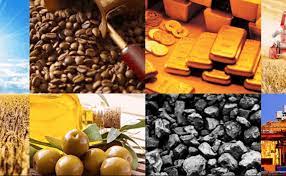Weather patterns affect many things, not just your summer vacation. A hurricane on the other side of the world might not impact you, but if it wipes out crops in the region, it could cause your weekly grocery bill to rise.
Droughts and long spells of unseasonal wet weather impact production, supply, and prices. Farmers and traders closely monitor weather conditions as they can greatly influence agricultural and natural resource-based commodities. Here are some of the key commodities that are affected by poor weather.
Agricultural Crops
Crops like corn, wheat, and barley are important. Wheat feeds billions of people and livestock around the world, as well as being used in things like biofuel production. Bad weather can have a devastating impact on the crops below.
Grains
Poor weather, such as hurricanes, drought, excessive rainfall, or extreme temperatures, can severely impact grain crops like corn, wheat, and rice. Reduced yields due to unfavorable weather conditions lead to lower supply, which in turn affects prices.
Fruits and Vegetables
Frost, hailstorms, or excessive heat can damage fruit orchards and vegetable farms, impacting harvests and causing higher prices for produce such as apples, oranges, tomatoes, and lettuce.
Coffee and Cocoa
These tropical commodities are susceptible to changes in temperature and rainfall patterns. Droughts or heavy rains can disrupt coffee and cocoa plantations, affecting their growth, quality, and subsequent market prices.
Livestock and Dairy
Livestock are just as susceptible to bad weather and prolonged spells of it will affect global commodity prices, as any good commodity trading advisor will tell you.
Cattle and Poultry
Extreme heatwaves, prolonged droughts, or heavy rains can affect the health and productivity of livestock. Limited access to grazing lands or water scarcity can lead to reduced animal feed availability, higher costs, and ultimately affect meat and dairy prices.
Fisheries
Poor weather conditions like storms or hurricanes disrupt fishing activities. If fishing boats can’t venture out because of storms, fish catches are reduced, impacting both local and international markets. In addition, there is evidence to suggest that hurricanes affect fish in deep waters.
Energy Commodities
The way the Ukraine conflict hit global gas prices is a good example of how geopolitical issues affect energy, but what effect does the weather have?
Oil and Gas
Severe weather events, such as hurricanes or storms may disrupt offshore oil and gas operations, leading to production shutdowns and supply disruptions. This can result in higher energy prices, affecting various sectors of the economy.
Renewable Energy
Weather patterns play a crucial role in the generation of renewable energy, such as wind and solar power. Calm winds or cloudy days can reduce energy output, impacting supply and potentially affecting the cost of electricity.
Precious Metals
Poor weather can even affect gold production, with weather-related disruptions, such as floods or landslides in gold mining regions, hindering extraction activities. This can constrain the global supply of gold, leading to potential price fluctuations in the precious metal market.
It’s important to note that the impact of poor weather on commodities can vary by region. Different crops and commodities are cultivated in different parts of the world, making them susceptible to region-specific weather patterns and events.





Be First to Comment